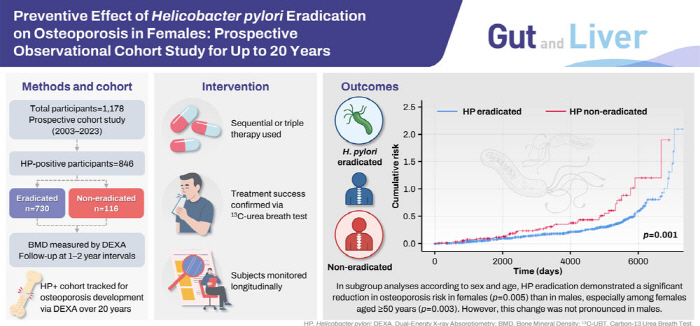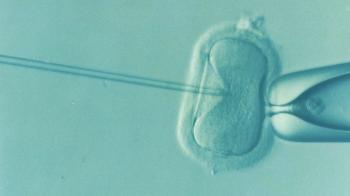Eradication treatment to eliminate Helicobacter bacteria that cause gastritis and gastric cancer reduces the prevalence of osteoporosis by 29%
Aug 18, 2025
|
In particular, the preventive effect was found to be clear in women over 50 years of age.
A research team led by Professor Kim Na-young of the Department of Gastroenterology at Bundang Seoul National University Hospital (Professor Kim Ye-jin, Professor Choi Yong-hoon, and Professor Gong Sung-hye of the Department of Endocrine Metabolism) recently published the results of this study online in the international journal `Gut and River'.
Helicobacter pylori is a harmful bacterium that lives in the stomach and causes chronic gastritis, gastric ulcers, and stomach cancer, and is a first-class carcinogen designated by the World Health Organization (WHO). It is mainly transmitted through the oral cavity, and it is estimated that about half of the world's population is carrying it. As of 2017, the prevalence rate in Korea reached 44% among those aged 16 and over.
In the past, Helicobacter bacteria were recognized as having an effect only on the digestive system, but recently, it has been reported to increase the risk of systemic diseases by causing △ systemic inflammation △ oxidative stress △ hormone regulation disturbance. As a result, awareness of eradication treatment is also changing significantly, and in Korea, Professor Kim Na-young's research team identified the link between Helicobacter infection and various metabolic diseases such as diabetes and hyperlipidemia, and revealed that eradication treatment can reduce the incidence of coronary artery disease.
The research team further sought to clarify the link between osteoporosis and Helicobacter pylori. Osteoporosis is a disease in which bones are weakened and major joints such as hip joints are easily fractured, and it is one of the main causes of increased mortality in the elderly. In Korea, the prevalence rate is so high that one in three women over the age of 50 suffer from osteoporosis fact sheets in 2023, causing enormous socioeconomic burdens.
According to the research team's follow-up observation of 846 adults who were tested for Helicobacter at Seoul National University Bundang Hospital for up to 20 years from 2003 to 2023, the incidence of osteoporosis in the group without eradication treatment was 34.5%, while the group that successfully eradicated Helicobacter pylori was only 24.5%, showing a difference in incidence of 10%. The figure is relatively down by about 29%.
This preventive effect was more pronounced, especially in women, and was found to be most effective in female patients over 50 years of age. In men, no significant association between eradication treatment and the incidence of osteoporosis was identified.
The findings suggest the need to recognize Helicobacter pylori infection as a new risk factor for osteoporosis, which was not previously considered, and it is meaningful to prove that eradication treatment plays an important role in preventing osteoporosis that causes musculoskeletal diseases beyond digestive and metabolic diseases.
Professor Na-young Kim said, "Long-term follow-up studies have shown that Helicobacter pylori eradication treatment helps prevent not only stomach cancer but also chronic diseases of the body such as osteoporosis." Especially, women in this age group need to actively consider eradication treatment, as it has the best preventive effect in female patients over 50 years of age whose bone density rapidly decreases after menopause."," he said.
On the other hand, this study was conducted with the support of research funds from the National Institute of Health of the Korea Centers for Disease Control and Prevention for the diagnosis and treatment of gastrointestinal diseases in the next class, and the application of clinical sites.
|
This article was translated by Naver AI translator.















